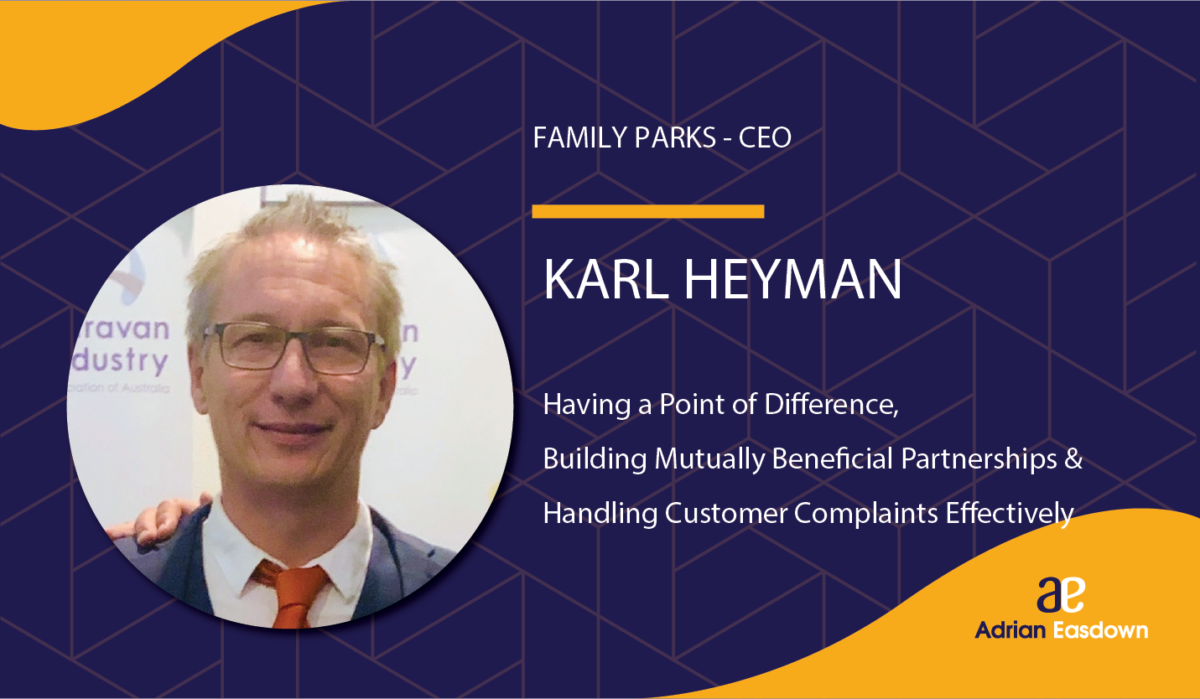Karl Heyman, the CEO of Family Parks in Australia and New Zealand, is always thinking outside the box when it comes to developing a point of difference. This is highlighted each year through his stand at the Caravan Industry National Conference which serves up a nice cold beer to conference delegates. Karl is known for his love of craft beer and is not shy when using it as an effective tool to attract passers-by. Karl tells listeners on this week’s episode of ‘That Bad Review’ podcast that it’s a great way to get conversations started, stressing that ‘without a point of difference you won’t be seen, you won’t be recognised, you won’t be remembered’. I enjoyed a beer at Karl’s stand this year and it worked, we got talking and out our chat led to Karl coming on the show to share his valuable industry insights with us.
Point of Difference
One question I regularly asks guests on the podcast is ‘What’s the future of the Caravan and Camping Industry?’. It’s a fascinating question to ask guests, as I receive differing perspectives from industry leaders from a wide range of backgrounds. I was recently told, ‘the amount of change we have experienced to date, is the least amount of change we are going to experience’. I mention this to Karl, adding ‘Is the glass half full or half empty? Where are we headed?’.
Karl enlightens listeners and I with his view that in the Caravan Park Industry, it’s the perceived threat of corporates or developers who are buying up parks to turn them into lifestyle villages, that we need to consider going forward. Caravan sales are still quite high, therefore as more parks are taken over, choice of places to stay for tourists will reduce, and competition to attract visitors will increase. Price will continue to factor in consumer decision making, and despite the increasing lack of choice, resort prices will continue to increase. The only way the average caravan park manager will be able to compete in this changing market will be to offer a point of difference. They will need to provide something that is different, something that is quirky or special to attract people to their parks.
Building Mutually Beneficial Partnerships
During our chat Karl and I discuss Family Parks recent announcement of their partnership with The Sunshine Glamping Parks based in China. Karl explains that the Chinese are exploring more than ever and they want a western experience. While the Chinese market traditionally travelled in groups, they are now travelling more independently, hiring a motorhome and traveling around. The Chinese population are also known to trust brands, so if they come to Australia or New Zealand and see a brand that they recognise from China, they will be more likely to choose that brand, in this case Family Parks. Likewise, when Australian and New Zealander’s travel to China. While people travel to experience different cultures, having a link to a trusted brand offers a sense of security in often overwhelmingly foreign surroundings. Karl and I discuss this exciting partnership in more detail in the podcast, and the changes that need to be made to accommodate a relationship between businesses from two vastly different cultures. Karl admits that it’s a balancing act to be able to cater to a culture in a way that visitors will still experience a completely different style of holiday.
In the podcast, Karl and I also discuss the process of forming partnerships and what the foundation of such relationships should include. Karl describes other partnerships that Family Parks have, such as one with the internationally renowned Australia Zoo and partnerships with smaller domestic entities like Leisure Tech. Karl explains to listeners that there are mutual benefits in both scenarios, it’s about seizing opportunities when they arise and leveraging them to not only grow your business but to help your partnering business grow too.
Handling Customer Complaints Effectively
Karl and I also discuss one of my favourite topics, reviews, and how to handle customer complaints effectively. Karl reminds listeners that a disgruntled customer is more likely to share a bad experience with more people than they will share a positive experience. He urges listeners to always keep in mind the damage a disgruntled guest can do to your business’s reputation, and handling their complaint should not start a battle between you and the guest, but instead be used as an opportunity to find a solution.
Karl’s advice mimics my own, in that it’s best to have a conversation with a disgruntled customer in private, which may mean taking it offline, or out of earshot of other guests. This will often deflate the situation as the customer is no longer performing for attention. The next step is to offer a solution, preferably on that makes them feel better about the situation, but is not detrimental to your business.
In the podcast Karl shares Family Park’s opening sentence used in the initial response to written complaints, one that often leaves the reviewer questioning themselves and questioning the possibility that their expectations were unreasonably high to begin. Karl and I agree that there is a certain skill needed to handle complaints effectively, the process can get emotional at times and negative emotions can cloud decision making. The best thing to do is to keep calm and gather yourself before responding to reviews. Keep in mind that you are not only replying to the guest, but to hundreds of potential clients that may read the review.
Also on the podcast
In this episode of the ‘That Bad Review’ podcast Karl and I also discuss:
- The importance of travel to a younger generation
- Ensuring you give back to the planet when travelling
- How to set yourself up for life by getting the basics right
- Karl’s love of craft beer and the rapidly growing industry in Australia
- The sheer size and benefits to members of the Caravan Club in the UK
- Similarities and disparities between the Caravan Park Industry in Australia and the UK
- The importance of asking questions, making people laugh and volunteering your time

